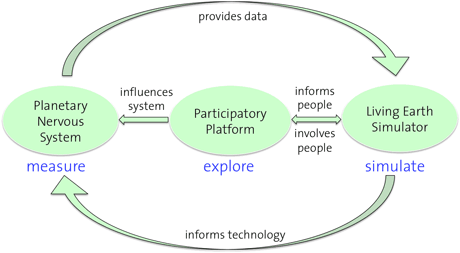by Steven Bishop
Today, society and technology is changing at a pace that often outstrips our capacity to understand and manage them. As the recent financial crisis demonstrates, the systems that we have built to organize our affairs now possess an unprecedented degree of complexity and interdependence among their technological, social and economic components. This complexity often brings about counter-intuitive events driven by positive feedbacks that lead to domino-like cascades of failures. Neither the precepts of traditional science, nor our collective experience from a simpler past, adequately prepare us for the future. Thus the need to understand our complex world is the most urgent human challenge of the 21st century.

Figure 1: The “Living Earth Simulator” architecture.
The FuturICT project aims to develop a visionary system, aided by information generated by the data revolution. The project will use, and further develop, modern information technology integrated with the rest of science, producing a system that will be able to act as a ‘flight simulator’ so that we can produce pluralistic outcomes which themselves form a ‘policy wind tunnel’ for the development and testing of policies in the face of a complex and uncertain world. Such a system would gather and process data on a massive scale, giving politicians, decision-makers and citizens, much better knowledge on which to base decisions.
The Living Earth Simulator will enable the exploration of future scenarios at different degrees of detail, employing a variety of methods (such as sophisticated agent-based simulations and multi-scale models). Exploration will be supported via an open platform (what we call the ‘World of Modelling’), comparable to an app-store, to which scientists and developers can provide theoretically informed and empirically validated modelling components that map parts of our real world. The Planetary Nervous System acts as a global sensor network, providing data in real-time about socio-economic, environmental or technological systems. The Global Participatory Platform will promote communication, coordination, cooperation and participation of citizens. In this way, FuturICT will create opportunities to reduce the strict separation between users and providers, enabling us to harness the knowledge and creativity of multiple minds. The Global Participatory Platform will also support the creation of virtual worlds allowing us to explore possible futures in silico.
In addition, FuturICT will create an Innovation Accelerator that will identify innovations early on, discover valuable bits of knowledge in the flood of information, help to find the best experts for projects, and support the distributed generation of new knowledge. In particular, it will support communication and flexible coordination in large-scale projects and enhance quality assessment.
How: To succeed with its ambitious endeavour, the FuturICT project team is building communities, which integrate ICT, social and complexity sciences, in most European countries, the US, Japan, China, and Singapore. It will build the Living Earth Simulator by integrating Interactive Observatories, which explore certain areas of our global systems through a combination of large-scale data mining, computational modelling, supercomputing and participatory approaches. For example, FuturICT will build interconnected Observatories of Financial and Economic Instabilities, of Conflicts and Wars, of Social Well-Being, of Health Risks, and of Transportation and Logistics. These Observatories will be closely connected to overcome disciplinary silo thinking, to gain a systemic picture of risks and opportunities, and to facilitate an integrated risk management.
FuturICT has the potential to promote not only the beneficial co-evolution of ICT and society, but also to encourage a new synthesis of the social sciences. It is likely that a new information science will emerge from the availability of big data, and its massive application in theory-building and validating tools. Furthermore, the FuturICT project is expected to trigger off a new era of socio-inspired information and communication technologies. A final note, FuturICT is not interested in tracking individual behaviour or gathering data on individual actions. Its aim is to understand the macroscopic interdependencies within the highly complex systems on which we all depend. The FuturICT project will have a strong research focus on ethical issues, and is committed to informing the public about the use of socio-economic data. Thus FuturICT will exploit information responsibly, preserving individual freedom.
Link: http://www.futurict.eu
Please contact:
Steven Bishop
University College London, UK
E-mail:









